There’s a basic law of living that goes like this:
If you want more, do more.
It applies more or less across the board. You tend to get out of life in proportion to what you give.
Want more money or a bigger business? Work harder at it and you’ll have the best chances of success.
Want deeper, more fulfilling relationships with friends or family? Spend more time building those relationships and watch them blossom.
Want to be the best player on your team? Practice longer and harder than your confreres and you’ll slowly pull ahead of the pack.
You get the point.
Working out isn’t that simple, though.
The “more is better” approach works…until it doesn’t. And then it becomes counterproductive.
That is, in terms of building muscle, strength, and endurance, more training is generally better than less…but once you exceed your body’s ability to recover, the wheels start to fall off.
Here’s a short list of what can happen next:
- You struggle to finish your workouts.
- You lose strength and endurance.
- You sleep poorly.
- You struggle with fatigue and lethargy.
- You have odd aches and pains.
- You get sick more frequently.
These are all signs that there is a systemic imbalance between work and recovery.
Scientifically speaking, this symptomatology is known as “overtraining syndrome,” and chances are you’re going to wrestle with it to one degree or another at some point in your fitness journey.
Well, this article is going to help.
In it, you’re going to learn how to spot overtraining before it becomes a serious problem, what to do if/when you find yourself overtrained, how to prevent it in the first place.
So, let’s start with one of the more common (and misguided) cliches about overtraining…
Table of Contents
+Want to listen to more stuff like this? Check out my podcast!
Is Overtraining Real?
If you’ve been lurking in the workout advice space for any amount of time, you’ve likely heard one of two things about overtraining:
1. “There is no overtraining. There is only under-recovery.”
The idea here is that people feeling physically overwhelmed by their workouts aren’t really training that hard–they’re just failing to recovery properly.
2. “If you do more than 2 to 3 heavy weightlifting workouts and low-intensity cardio sessions per week, you will wind up overtrained.”
This school of thought is generally predicated on the belief that training intensely more than a few days per week over-stresses the central nervous system.
And if you’ve delved into both sides of this argument, you’ve probably found cogent defenses of each position.
Well, as usual, the truth seems to lie somewhere in the middle.
Heavy weightlifting places large amounts of stress on your muscles and central nervous system, but most people can train quite a bit harder than they currently are without any negative physical (tangible) side effects.
For example, let’s look at a study conducted by scientists at the University of Sydney.
The participants were young (20s and 30s) men with at least two years of weightlifting experience (and most had 5 or more years), and an average squat of about 155 kg.
Each of the men did two workouts twice per week–upper body and squats–for a total of 4 workouts per week.
For the squats specifically, the men were separated into three groups:
- Group 1 did 1 set of squats to failure with 80% of 1RM.
- Group 2 did 4 sets of the same.
- Group 3 did 8 sets of the same.
After 6 weeks, and each group gained strength (groups 2 and 3 gained significantly more than group 1, with 3 gaining the most).
Now, if you’ve ever squatted with 80% of your 1RM (5 to 7 rep range), you know how hard this workout program was.
One squat workout like this per week is challenging and two is downright grueling.
And yet, no signs of overtraining.
An even better (and more extreme) example can be found in a study conducted by researchers at McMaster University.
Here, 40 young, overweight men were split into two groups.
One group was put on the following regimen:
- 40% calorie deficit
- High protein intake (2.4 g/kg)
- 6 weightlifting and HIIT workouts per week
And the other group did the same thing but ate half the protein.
If you were to show that to most personal trainers, they would say you’re crazy. That all you’re going to accomplish is muscle loss and misery.
(And to be fair, I’m a fan of “aggressive” fat loss, but this isn’t something even I would generally recommend.)
Well, after four weeks, the participants in the high-protein group lost, on average, about 10.5 pounds of fat while gaining about 2.5 pounds of muscle, and the low-protein group lost about 8 pounds of fat and gained no muscle.
Now, my point isn’t that you should be doing 16 heavy sets of squats per week or running a massive calorie deficit with hours of intense exercise every week.
I just want to illustrate how much abuse some people’s bodies can take before going to seed.
Just how far you can go with your body depends on many things, including age, genetics, training history, diet, and sleep hygiene, but I promise you this:
It’s much harder to overtrain than most people think.
I’ve worked with thousands of people and can say with absolute certainty that if you’re a relatively healthy adult, you can do very well with something like the following:
- 3 to 6 hours of heavy weightlifting per week (3 to 5 workouts)
- 1 to 2.5 hours of cardio per week (depending on your goals)
- 20 to 25% calorie deficit with a high-protein and high-carb macro split
This is the basic strategy behind my Bigger Leaner Stronger (men) and Thinner Leaner Stronger (women) programs, by the way, and they work.
8 Signs of Overtraining That You Should Know

It may be difficult to overtrain–and it may be more of a psychological than physical state–but it can happen.
I had my first real experience with it years ago, when I was working with a personal trainer.
He had me training six days per week, doing 2+ hour workouts that pushed me well past physical exhaustion. To the point of mental prostration, really.
After 5 or 6 weeks of this ordeal, I was beat.
I was sleeping poorly. I ached all over. I could barely marshal enough energy to finish my workouts.
He suggested I take a week off to recuperate, and 7 days later, I felt like I had returned from the dead.
Now, if I had this article back then, I could have avoided the anguish.
You see, overtraining doesn’t happen overnight. It’s like quicksand–it devours you slowly, and the harder you fight against it, the faster you sink.
So, let’s discuss several signs of overtraining that indicate it’s time to take your foot off the gas for a beat.
1. Your workouts are feeling particularly hard.
When your body is fatigued, the perceived difficulty of exercise increases.
This is expected when you’ve just finished a set and are resting, but when it becomes the norm, it may indicate that your body needs a break.
2. You lack motivation to train.
If you normally look forward to your workouts but now have no desire to get in the gym, that’s a red flag.
It got so bad for me with that trainer that I eventually couldn’t even finish workouts. I was physically drained to the point where I couldn’t even will myself to try.
3. You feel depressed.
In some people, the mood disruption caused by overtraining extends beyond training.
They can lose motivation to do just about anything.
4. You’re perpetually sore.
Muscle soreness is part of weightlifting, but as you become more experienced, you get less and less sore regardless of what you do.
(This isn’t a bad thing, by the way–muscle soreness isn’t a reliable indicator of muscle growth.)
When you’re pushing the envelope, though, a persistent soreness can set in that just won’t fully go away.
5. You’re not sleeping well.
If you’re pushing your body too hard, your nervous system can become over-stimulated.
This makes it harder to fall and stay asleep and thus feel well rested.
6. You’re always tired.
If you’re not sleeping well, you’re going to be tired.
No surprise there.
But sometimes, when your body is on the edge, you can feel perpetually fatigued despite sleeping normally.
7. You have odd aches and pains.
The is one of the first things I notice when I’m due for downtime.
My shoulder starts to ache. Then my wrist. Then my knee.
These symptoms usually begin after 8 to 10 weeks of intense weightlifting and they’re gone within 3 to 5 days off.
(I should also mention that joint pain can be caused by other things, of course, like poor form or mobility.)
8. You’re getting sick more frequently than usual.
Prolonged periods of intense exercise can suppress the immune system, making you more prone to sickness.
4 Ways to Prevent Overtraining

Now that we know what overtraining is and how to head it off before it can sucker punch us, let’s talk about avoiding it altogether.
The most reliable strategies for warding it off are what you would expect.
They’re aimed at assisting your body’s natural recovery mechanisms and aren’t fancy, but they work.
If you do the following, it’s very unlikely that you will ever be afflicted with overtraining syndrome.
1. Get Enough Sleep

According to polling conducted by the National Sleep Foundation, 43% of Americans between the ages of 13 and 64 say they rarely or never get a good night’s sleep on weeknights.
60% say that they experience a sleep problem every night or almost every night.
Well, inadequate sleep is far worse for our health than many people realize.
It increases the mortality and the risk of chronic diseases like hypertension, diabetes, depression, obesity, and cancer, and it reduces quality of life and productivity.
It can even slow weight loss, lead to weight gain and muscle loss, and reduce testosterone levels.
The bottom line is that your sleep hygiene is like your diet—it’s either working for you or against you, regardless of whether you realize it.
Sleep poorly for too long, and the consequences, which are unavoidable, can be dire.
Sleep well, though, and the benefits can be surprisingly far-reaching.
Read this article to learn more about how to get the best sleep of your life.
2. Eat Enough Food

Many people know that the amount of protein they eat affects recovery, but not so many know that the amount of calories does as well.
The reason for this is rather simple:
If you feed your body less energy than it burns every day, you’ve created an energy (or calorie) deficit.
This is necessary for fat loss, but it also impairs your body’s ability to create muscle proteins and can reduce anabolic and increase catabolic hormone levels.
This hobbles recovery, of course, and slows down (or even halts) muscle growth as well.
3. Manage Your Stress Levels

Many people think of stress as something purely negative. Something to be avoided at all costs.
This is wrongheaded.
Our bodies are built to deal with acute stress, which is one of the reasons why exercise is so beneficial to our health and well-being.
Too much stress for too long causes problems, though.
Namely, chronic stress causes us to age faster, become more susceptible to disease, and experience elevated levels of systemic inflammation.
It also causes cortisol levels to remain chronically elevated, which, among many things, blunts our body’s ability to recover from our workouts.
Thus, stress management is an important part of keeping overtraining at bay.
In fact, I’d go so far to say that the overall quality and longevity of your life is going to depend heavily on how well you can de-stress.
Check out this article to learn more.
4. Rest or Deload

As much as we might like working out, we have to abstain every so often.
(In my Bigger Leaner Stronger and Thinner Leaner Stronger programs, for example, you turn down the volume every eight weeks.)
There are two ways to do this:
1. Stay out of the gym for a week.
Spend the time you would normally be working out doing something relaxing instead. Simple and effective.
2. Take a deload week.
A deload week is a reduction in weekly training intensity (weight load) and/or volume (sets performed).
For example, if your training routine consists of five workouts per week of 70 to 80 reps of heavy, compound weightlifting (high fives), a deload week might cut the volume in half (35 to 40 reps) or dramatically reduce the intensity (work with 50 to 60% of one-rep max instead of 80 to 90%).
Read this article to learn how to do it right.
What About Supplements?
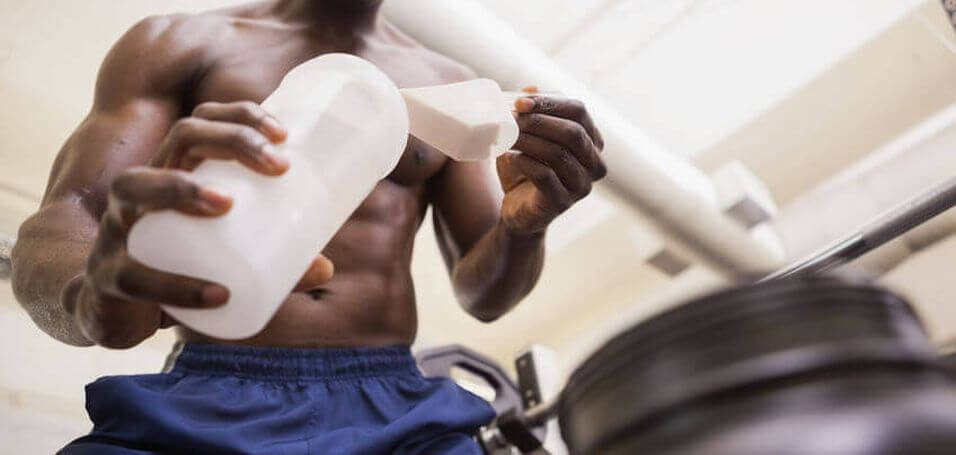
I saved this for last because, quite frankly, it’s far less important than proper diet and training.
You see, supplements don’t build great physiques–dedication to proper training and nutrition does.
Unfortunately, the workout supplement industry is plagued by pseudoscience, ridiculous hype, misleading advertising and endorsements, products full of junk ingredients, underdosing key ingredients, and many other shenanigans.
Most supplement companies produce cheap, junk products and try to dazzle you with ridiculous marketing claims, high-profile (and very expensive) endorsements, pseudo-scientific babble, fancy-sounding proprietary blends, and flashy packaging.
So, while workout supplements don’t play a vital role in building muscle and losing fat, and many are a complete waste of money…the right ones can help.
The truth of the matter is there are safe, natural substances that have been scientifically proven to deliver benefits such as increased strength, muscle endurance and growth, fat loss, and more.
As a part of my work, it’s been my job to know what these substances are, and find products with them that I can use myself and recommend to others.
Finding high-quality, effective, and fairly priced products has always been a struggle, though.
That’s why I took matters into my own hands and decided to create my own supplements. And not just another line of “me too” supplements–the exact formulations I myself have always wanted and wished others would create.
I won’t go into a whole spiel here though. If you want to learn more about my supplement line, check this out.
For the purpose of this article, let’s just quickly review the supplements that are going to help you recover better.
Creatine
Creatine is a substance found naturally in the body and in foods like red meat.
It’s perhaps the most researched molecule in the world of sport supplements–the subject of hundreds of studies–and the consensus is very clear.
Supplementation with creatine helps…
If there’s one recovery supplement I recommend that everyone take, it’s creatine.
You may have heard that creatine is bad for your kidneys, but these claims have been categorically and repeatedly disproven. In healthy subjects, creatine has been shown to have no harmful side effects, in both short- or long-term usage. People with kidney disease are not advised to supplement with creatine, however.
If you have healthy kidneys, I highly recommend that you supplement with creatine. It’s safe, cheap, and effective.
In terms of specific products, I use my own, of course, which is called RECHARGE.
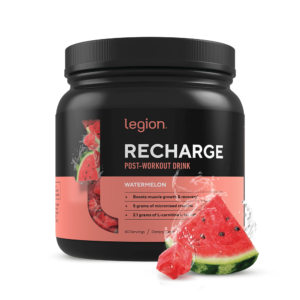
RECHARGE is 100% naturally sweetened and flavored and each serving contains:
- 5 grams of creatine monohydrate
- 2100 milligrams of L-carnitine L-tartrate
- 10.8 milligrams of corosolic acid
This gives you the proven strength, size, and recovery benefits of creatine monohydrate plus the muscle repair and insulin sensitivity benefits of L-carnitine L-tartrate and corosolic acid.
Whey Protein
You don’t need protein supplements to recover effectively from your workouts, but considering how much protein you need to eat every day to recover and build muscle optimally, getting all your protein from whole food can be impractical.
That’s the main reason I created (and use) a whey protein supplement. (There’s also evidence that whey protein is particularly good for your post-workout nutrition.)
Here’s what I use:

Multivitamin
Similar to protein powder, a multivitamin isn’t going to accelerate recovery per se…but ensuring your body is getting all the nutrition it needs will.
The problem is the Western diet has quite a few nutritional holes, so achieving this through food alone is a constant struggle.
This is why I think a good multivitamin supplement makes sense to add to your recovery regimen, and one of the reasons I created my own.
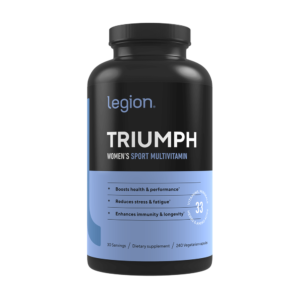
TRIUMPH contains more than 22 essential vitamins and minerals as well–it also has 14 additional ingredients that improve general health and overall well-being, enhances physical and mental performance, and protects against disease.
Greens Supplement
Most greens supplements are basically poorly formulated and underdosed multivitamins, which means they may or may not help you depending mainly on the quality of your diet.
This is why…surprise surprise…I created my own, and went about it very differently.
I started with a base of leafy greens that are rich in nitrates and other beneficial phytochemicals. (Leafy greens are some of the most nutrient-dense plant foods we can eat.)
I knew I also wanted a clinically effective dosage of spirulina because it’s widely considered one of nature’s richest and most complete sources of vital nutrients (and it accelerates muscle recovery, as well).
Next, I put together a combination of other beneficial ingredients that we aren’t going to get from our diets, like reishi mushroom, maca, and astragalus membranaceus.
Well, the result is GENESIS, and it’s unlike any other greens supplement on the market today.
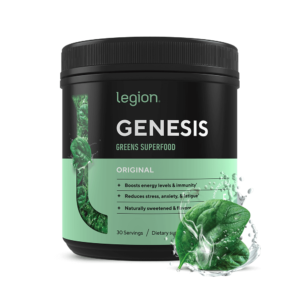
Sleep Supplement
As you know, the better you sleep, the better your body can recover from the stresses of training and life.
Good sleep hygiene is like a good exercise routine: it improves your life in just about every way.
This is why many people turn to hypnotics and sedatives to combat their sleep troubles, but these drugs are habit-forming and associated with a rather scary set of side effects, including…
- Depression
- Increased risk of cancer and overall mortality
- Increased risk of infections
- Delirium, nightmares, and hallucinations
A smarter approach—before turning to drugs or even supplements—is to address lifestyle.
When you’ve done that and are still having sleep troubles or just want to sleep even better, then it makes sense to look to supplementation.
And that’s why I created LUNAR.
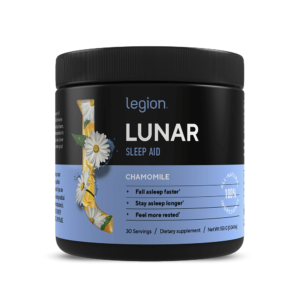
LUNAR contains 4 natural, safe, and non-habit-forming ingredients that help you fall asleep faster, enjoy longer and deeper sleep, and wake up feeling rested and rejuvenated, not groggy and lethargic.
The Bottom Line on Overtraining

Overtraining syndrome is real but our bodies aren’t as fragile as some “gurus” would have you believe.
The bottom line is you can probably train quite a bit harder than you think without risking overtraining.
And that’s especially true if you follow the advice in this article and do everything you can to assist your body’s ability to recover from the stress of workouts and daily life.
That said, there will probably be times where you push the envelope in terms of exercise intensity or frequency or where you don’t quite sleep or eat as much as you should.
When this happens, be on the lookout for the signs of overtraining that we’ve discussed and deal with them accordingly and you’ll never get hit with a full-blown overtraining “crisis.”
What’s your take on overtraining? Have anything else to share? Let me know in the comments below!
Scientific References +
- Toner, L. C., Tsambiras, B. M., Catalano, G., Catalano, M. C., & Cooper, D. S. (2000). Central nervous system side effects associated with zolpidem treatment. Clinical Neuropharmacology, 23(1), 54–58. https://doi.org/10.1097/00002826-200001000-00011
- Kripke, D. F. (2008). Possibility that certain hypnotics might cause cancer in skin. Journal of Sleep Research, 17(3), 245–250. https://doi.org/10.1111/j.1365-2869.2008.00685.x
- Kripke, D. F., Langer, R. D., & Kline, L. E. (2012). Hypnotics’ association with mortality or cancer: A matched cohort study. BMJ Open, 2(1). https://doi.org/10.1136/bmjopen-2012-000850
- Kripke, D. F. (2007). Greater incidence of depression with hypnotic use than with placebo. BMC Psychiatry, 7(1), 42. https://doi.org/10.1186/1471-244X-7-42
- Cordain, L., Eaton, S. B., Sebastian, A., Mann, N., Lindeberg, S., Watkins, B. A., O’Keefe, J. H., & Brand-Miller, J. (2005). Origins and evolution of the Western diet: Health implications for the 21st century. In American Journal of Clinical Nutrition (Vol. 81, Issue 2, pp. 341–354). American Society for Nutrition. https://doi.org/10.1093/ajcn.81.2.341
- Fukushima, M., Matsuyama, F., Ueda, N., Egawa, K., Takemoto, J., Kajimoto, Y., Yonaha, N., Miura, T., Kaneko, T., Nishi, Y., Mitsui, R., Fujita, Y., Yamada, Y., & Seino, Y. (2006). Effect of corosolic acid on postchallenge plasma glucose levels. Diabetes Research and Clinical Practice, 73(2), 174–177. https://doi.org/10.1016/j.diabres.2006.01.010
- Ho, J. Y., Kraemer, W. J., Volek, J. S., Fragala, M. S., Thomas, G. A., Dunn-Lewis, C., Coday, M., Häkkinen, K., & Maresh, C. M. (2010). L-Carnitine l-tartrate supplementation favorably affects biochemical markers of recovery from physical exertion in middle-aged men and women. Metabolism: Clinical and Experimental, 59(8), 1190–1199. https://doi.org/10.1016/j.metabol.2009.11.012
- Francaux, M., & Poortmans, J. R. (2006). Side effects of creatine supplementation in athletes. In International journal of sports physiology and performance (Vol. 1, Issue 4, pp. 311–323). Int J Sports Physiol Perform. https://doi.org/10.1123/ijspp.1.4.311
- Mesa, J. L. M., Ruiz, J. R., González-Gross, M. M., Gutiérrez Sáinz, Á., & Castillo Garzón, M. J. (2002). Oral creatine supplementation and skeletal muscle metabolism in physical exercise. In Sports Medicine (Vol. 32, Issue 14, pp. 903–944). Adis International Ltd. https://doi.org/10.2165/00007256-200232140-00003
- Poortmans, J. R., & Francaux, M. (2000). Adverse effects of creatine supplementation: Fact or fiction? In Sports Medicine (Vol. 30, Issue 3, pp. 155–170). Adis International Ltd. https://doi.org/10.2165/00007256-200030030-00002
- Bassit, R. A., Pinheiro, C. H. D. J., Vitzel, K. F., Sproesser, A. J., Silveira, L. R., & Curi, R. (2010). Effect of short-term creatine supplementation on markers of skeletal muscle damage after strenuous contractile activity. European Journal of Applied Physiology, 108(5), 945–955. https://doi.org/10.1007/s00421-009-1305-1
- Eckerson, J. M., Stout, J. R., Moore, G. A., Stone, N. J., Iwan, K. A., Gebauer, A. N., & Ginsberg, R. (2005). Effect of creatine phosphate supplementation on anaerobic working capacity and body weight after two and six days of loading in men and women. Journal of Strength and Conditioning Research, 19(4), 756–763. https://doi.org/10.1519/R-16924.1
- Branch, J. D. (2003). Effect of creatine supplementation on body composition and performance: A meta-analysis. International Journal of Sport Nutrition and Exercise Metabolism, 13(2), 198–226. https://doi.org/10.1123/ijsnem.13.2.198
- Lehmann, M., Foster, C., Dickhuth, H. H., & Gastmann, U. (1998). Autonomic imbalance hypothesis and overtraining syndrome. Medicine and Science in Sports and Exercise, 30(7), 1140–1145. https://doi.org/10.1097/00005768-199807000-00019
- González-Cabrera, J., Fernández-Prada, M., Iribar-Ibabe, C., & Peinado, J. M. (2014). Acute and chronic stress increase salivary cortisol: A study in the real-life setting of a national examination undertaken by medical graduates. Stress, 17(2), 149–156. https://doi.org/10.3109/10253890.2013.876405
- Irie, M., Asami, S., Nagata, S., Miyata, M., & Kasai, H. (2002). Psychological mediation of a type of oxidative DNA damage, 8-hydroxydeoxyguanosine, in peripheral blood leukocytes of non-smoking and non-drinking workers. Psychotherapy and Psychosomatics, 71(2), 90–96. https://doi.org/10.1159/000049351
- Epel, E. S., Lin, J., Wilhelm, F. H., Wolkowitz, O. M., Cawthon, R., Adler, N. E., Dolbier, C., Mendes, W. B., & Blackburn, E. H. (2006). Cell aging in relation to stress arousal and cardiovascular disease risk factors. Psychoneuroendocrinology, 31(3), 277–287. https://doi.org/10.1016/j.psyneuen.2005.08.011
- Epel, E. S., Blackburn, E. H., Lin, J., Dhabhar, F. S., Adler, N. E., Morrow, J. D., & Cawthon, R. M. (2004). Accelerated telomere shortening in response to life stress. Proceedings of the National Academy of Sciences of the United States of America, 101(49), 17312–17315. https://doi.org/10.1073/pnas.0407162101
- Tomiyama, A. J., Mann, T., Vinas, D., Hunger, J. M., Dejager, J., & Taylor, S. E. (2010). Low calorie dieting increases cortisol. Psychosomatic Medicine, 72(4), 357–364. https://doi.org/10.1097/PSY.0b013e3181d9523c
- Cangemi, R., Friedmann, A. J., Holloszy, J. O., & Fontana, L. (2010). Long-term effects of calorie restriction on serum sex-hormone concentrations in men. Aging Cell, 9(2), 236–242. https://doi.org/10.1111/j.1474-9726.2010.00553.x
- Zito, C. I., Qin, H., Blenis, J., & Bennett, A. M. (2007). SHP-2 regulates cell growth by controlling the mTOR/S6 kinase 1 pathway. Journal of Biological Chemistry, 282(10), 6946–6953. https://doi.org/10.1074/jbc.M608338200
- Leproult, R., & Van Cauter, E. (2011). Effect of 1 week of sleep restriction on testosterone levels in young healthy men. In JAMA - Journal of the American Medical Association (Vol. 305, Issue 21, pp. 2173–2174). JAMA. https://doi.org/10.1001/jama.2011.710
- Nedeltcheva, A. V., Kilkus, J. M., Imperial, J., Schoeller, D. A., & Penev, P. D. (2010). Insufficient sleep undermines dietary efforts to reduce adiposity. Annals of Internal Medicine, 153(7), 435–441. https://doi.org/10.7326/0003-4819-153-7-201010050-00006
- Colten, H. R., & Altevogt, B. M. (2006). Sleep disorders and sleep deprivation: An unmet public health problem. In Sleep Disorders and Sleep Deprivation: An Unmet Public Health Problem. National Academies Press. https://doi.org/10.17226/11617
- Mackinnon, L. T. (2000). Overtraining effects on immunity and performance in athletes. Immunology and Cell Biology, 78(5), 502–509. https://doi.org/10.1111/j.1440-1711.2000.t01-7-.x
- Pearce, P. Z. (2002). A practical approach to the overtraining syndrome. In Current sports medicine reports (Vol. 1, Issue 3, pp. 179–183). Curr Sports Med Rep. https://doi.org/10.1249/00149619-200206000-00009
- Lehmann, M., Foster, C., & Keul, J. (1993). Overtraining in endurance athletes: A brief review. In Medicine and Science in Sports and Exercise (Vol. 25, Issue 7, pp. 854–862). Med Sci Sports Exerc. https://doi.org/10.1249/00005768-199307000-00015
- Armstrong, L. E., & VanHeest, J. L. (2002). The unknown mechanism of the overtraining syndrome: Clues from depression and psychoneuroimmunology. In Sports Medicine (Vol. 32, Issue 3, pp. 185–209). Adis International Ltd. https://doi.org/10.2165/00007256-200232030-00003
- Kreher, J. B., & Schwartz, J. B. (2012). Overtraining Syndrome: A Practical Guide. In Sports Health (Vol. 4, Issue 2, pp. 128–138). SAGE Publications. https://doi.org/10.1177/1941738111434406
- Longland, T. M., Oikawa, S. Y., Mitchell, C. J., Devries, M. C., & Phillips, S. M. (2016). Higher compared with lower dietary protein during an energy deficit combined with intense exercise promotes greater lean mass gain and fat mass loss: a randomized trial. The American Journal of Clinical Nutrition, 103(3), 738–746. https://doi.org/10.3945/ajcn.115.119339
- Robbins, D. W., Marshall, P. W. M., & McEwen, M. (2012). The effect of training volume on lower-body strength. Journal of Strength and Conditioning Research, 26(1), 34–39. https://doi.org/10.1519/JSC.0b013e31821d5cc4
- St Clair Gibson, A., Lambert, M. I., & Noakes, T. D. (2001). Neural control of force output during maximal and submaximal exercise. In Sports Medicine (Vol. 31, Issue 9, pp. 637–650). Sports Med. https://doi.org/10.2165/00007256-200131090-00001










